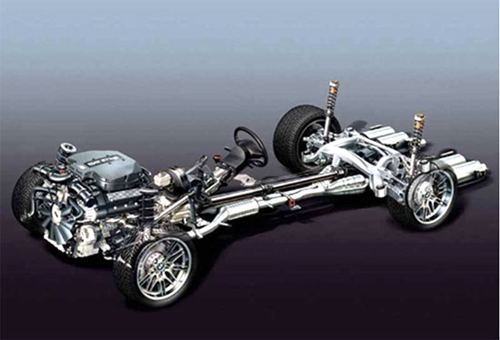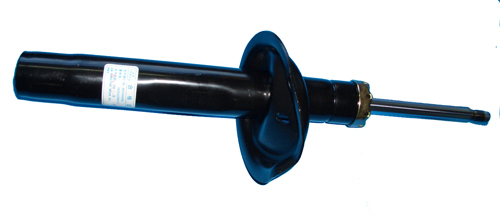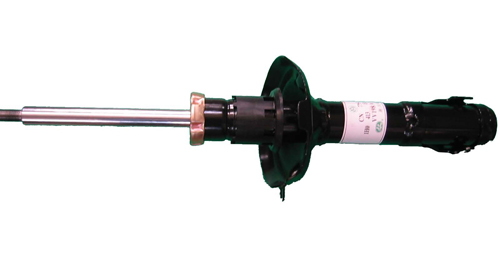China's Chassis System and Parts Makers Take Different Roads to Competitiveness
2011/08/26 | By CENS
Sales in developed economies have also weakened. In the United States, for example, new-car sales totaled 1.05 million units in June—the lowest level since last December—and sales in Japan shrank 23% for the month.
Despite the recent sales sluggishness, Ford Motor CFO Lewis Booth has predicted that the global growth of new-car sales will be sustained over the next decade by fast-growing demand in Asian countries. As China has become the world's largest new-car market and is expected to lead the growth of the global market during the coming 10 years, local manufacturers of auto parts are given an excellent chance to boost their global image and capabilities.
Unfazed by the souring of the global market for new cars, China's chassis systems and related parts industry has experienced robust growth so far this year. Statistics compiled by the China Association of Automotive Manufacturers (CAAM) show that exports of auto transmission parts, for instance, reached US$933 million in the first five months of this year for a 26.58% growth compared with a year earlier, while imports increased at an annual rate of 16.28% to US$3.94 billion. The main sources of those imports were Japan, Germany, Korea, the U.S., and France.
Chinese suppliers of driving systems and parts are thriving as well, with total exports (mainly to the U.S., Australia, Russia, and Germany) of US$5.348 billion during the January-May period for a 41% increase from a year earlier. Imports of these items grew 30.82%, to US$485 million.


To some degree, these figures indicate that after years of development the Chinese chassis systems and parts industry is increasingly recognized in the global supply chain, with exports exceeding imports in all of the four categories mentioned above.
Working With Local Automakers
However, Liu Xinggui, a local vibration damper sales manager for the Faw-Tokico Shock Absorber Co., thinks that the industry still needs more time to develop, as most suppliers are small in scale and have backward R&D capabilities.
“While foreign joint ventures with excellent R&D capability have led the market,” Liu explains, “a few local manufacturers have relied on strategic cooperation with local automakers to strengthen their presence.” Since no local manufacturer will be capable of supplying as many damper models as their German, American, and Japanese counterparts, or of capturing a major share of the market independently in the short term, Liu feels that “In the near future, these partnerships between automakers and vibration damper supplies will be a common feature of China's auto industry, helping to secure the sector's sustainable development.”
Sun Weidong, chairman of the damper council of CAAM, notes that the demand for dampers has been growing rapidly along with the development of the local auto industry. With more local manufacturers actively expanding capacity and upgrading production to catch up with world standards, China-made dampers have already improved substantially in quality and are increasingly being adopted for mid- and low-end cars.
Improving Through Joint Ventures
Cooperation with foreign partners in joint ventures is an important way to boost the sector's capabilities. The Hangzhou Fuding Transport Equipments Co., established in 1993, was the first firm to be established in China as a joint venture with foreign participation for the production of vibration dampers; with technological support from its overseas partners, the company has evolved into one of the biggest damper manufacturers in the country today.
Drawing on CAD (computer aided design) technology and outsourcing key components with the aim of developing products that measure up to international standards, the company has come up with seven series car dampers, oil cylinders, and gas springs in more than 400 different specifications, and turns them out at a maximum of 2.5 million units annually. Deputy sales manager Tian Qiang says that the company's exports of dampers, covering a range from the low end to the high, has increased steadily at more than 10% annually in recent years, going mainly to markets for modified cars in Belarus and Germany.
Chen Kaiwen, CEO of Gasgoo.com, a Chinese car-market information website, comments that since the global market has become more challenging due to price competition and has become less accessible to Chinese auto parts suppliers, especially those lacking in core competencies, the more manufacturers there can improve their technology through cooperation with foreign partners, the more likely the industry will be to carve out success overseas.
Acquisitions Help Too
The Nanyang Cijan Auto Shock Absorber Co. has bought WayAssauto, a prominent European shock-absorber company, indicating that the acquisition of foreign companies is another effective way for Chinese chassis parts makers to quickly climb the global supply chain.
Cijan, established in 1951, manufactures shock absorbers for high-end cars in a factory equipped with advanced machinery, most of it imported from Germany. Taking advantage of its experience in applying foreign state-of-the-art technologies to the improvement of production, the company has obtained 32 national patents and is independently capable of handling the development and production of suspension systems. The company is the only local supplier that has been certified by the FAW-VW Automobile Co., a large Chinese automaker, to produce its Jetta-brand suspension system parts.
The company bought WayAssauto as a means of further boosting its competitiveness. “Cijan has effectively increased its capacity with automated production through technological support from WayAssauto,” says Zhang Junfang, a Chinese commercial councilor in Italy. “It is wonderful; I am so proud of Cijan.”
WayAssauto, once the biggest shock-absorber maker in Europe, has been a recognized supplier for such well-known brands as Benz and Ferrari. The buyout will help Cijan not only to heighten its production, but also to expand its foothold in Europe.
“Cijan has already completed the registration of a European subsidiary, called New WayAssauto,” reports Zhao Yingran, deputy manager of Cijan's international sales department, who handled the whole acquisition process. He notes that establishment of the new company is just the beginning of Cijan's foray into the European market, saying, “Through WayAssauto's sound distribution networks, Cijan expects to become more globally known and attract more foreign investments.”






